It’s what everyone is talking about. The metaverse is revolutionising society and the world of languages. Can you imagine being able to train, meet people and sell your products in a parallel universe? At our translation company, we find this type of progress incredible! In fact, we find it so fascinating that in this article we want to explain what the world of languages will look like in this virtual reality. Do you want to find out? Keep reading!
What is the metaverse?
If you’re trying to find a physical location for the metaverse, we are sorry to have to tell you that there isn’t one. The metaverse is a virtual world. There are already countless companies working hard on this concept, such as Google, Facebook and Microsoft.
Since the metaverse is a virtual world, you need a device to connect to it. The most common device is virtual reality glasses.
Once you put on your virtual reality glasses and connect to the metaverse you will find yourself in a totally new world. The metaverse is like a video game that transports you to a parallel universe.

What languages are spoken in the metaverse?
You will no doubt have read news reports discussing the virtual constructions taking place in the metaverse and even the crazy purchases being made of homes or products that cannot be taken out of that virtual world. Technology has advanced so much that today if you don’t use it or don’t follow the new trends you will be left behind.
That is why many companies have begun to consider advertising their products and services within the bounds of virtual reality. But this creates a dilemma: What language will be spoken? Should the metaverse be translated? Will we have a lingua franca, a role played by English in the real world?
“The metaverse will speak Spanish”
It’s still too early to say exactly which languages are most widely spoken in the metaverse now and what the situation will be like in a few years. However, there are people at the Spanish Royal Academy of Language (RAE) who want Spanish to ascend to the throne for languages in this virtual world. Specifically, this idea comes from the computer expert Asunción Gómez-Pérez, a new RAE academic and the first to come from the field of engineering and artificial intelligence.
The academic explains in an interview that her institution is working hard to ensure that any artificial intelligence programs developed use Spanish correctly. It is worth reminding ourselves that these technologies are capable of detecting any texts that are not written properly. As a result, she hopes that the Spanish language will come to dominate the virtual world.
What is translation like in the metaverse?
There are all sorts of opinions about the metaverse and languages. The most common one is that it will help to democratise language learning. However, it will also help companies obtain the exposure they want for their products or services. And this is where professional translation will play a particularly important role.
At the moment, it seems that the plans involve using artificial intelligence to make this virtual world accessible to everyone. This is what Mark Zuckerberg has announced. His plans involve using AI to develop a universal translator in over 100 languages that connects people from all over the world.
Although artificial intelligence has become an extremely useful tool for languages, we still believe that the best translation is that carried out by humans. That is why the translation of the metaverse, even if it is done by AI, should be supervised by professional translators who understand the language and can deal with the linguistic twists and double meanings present in language, something that a machine will never be able to do, however much we want it to.
Is it better to translate it or localise it?
Let’s imagine that you contact our translation agency in London. You need the professional translation of a product to be sold in Morocco. The first thing that comes to mind is requesting a professional translation. But are you sure you don’t need to localise your content too? The same is true for the metaverse.
Translation refers to transferring content from one language to another, while localisation goes much further. Localisation focusses on a country’s culture to help adapt a product or service to new countries. That is why the translation and localisation of software is so common. And it will always be just as necessary in this world.
Localisation adapts the graphics, slogans and colours to the culture of the country. Therefore, the most appropriate service for the metaverse might be a combined professional translation and localisation service. The result could be amazing, don’t you agree?













